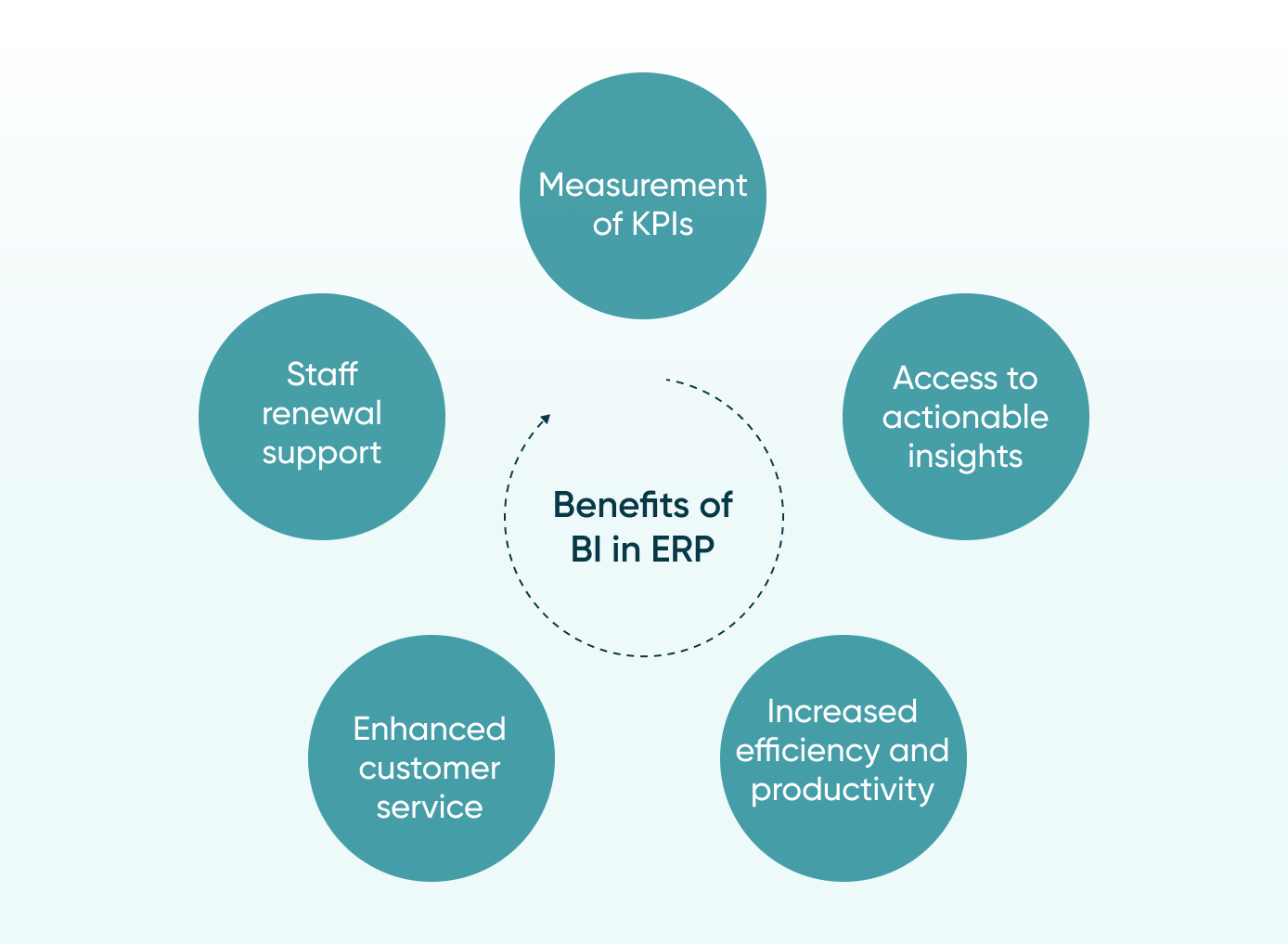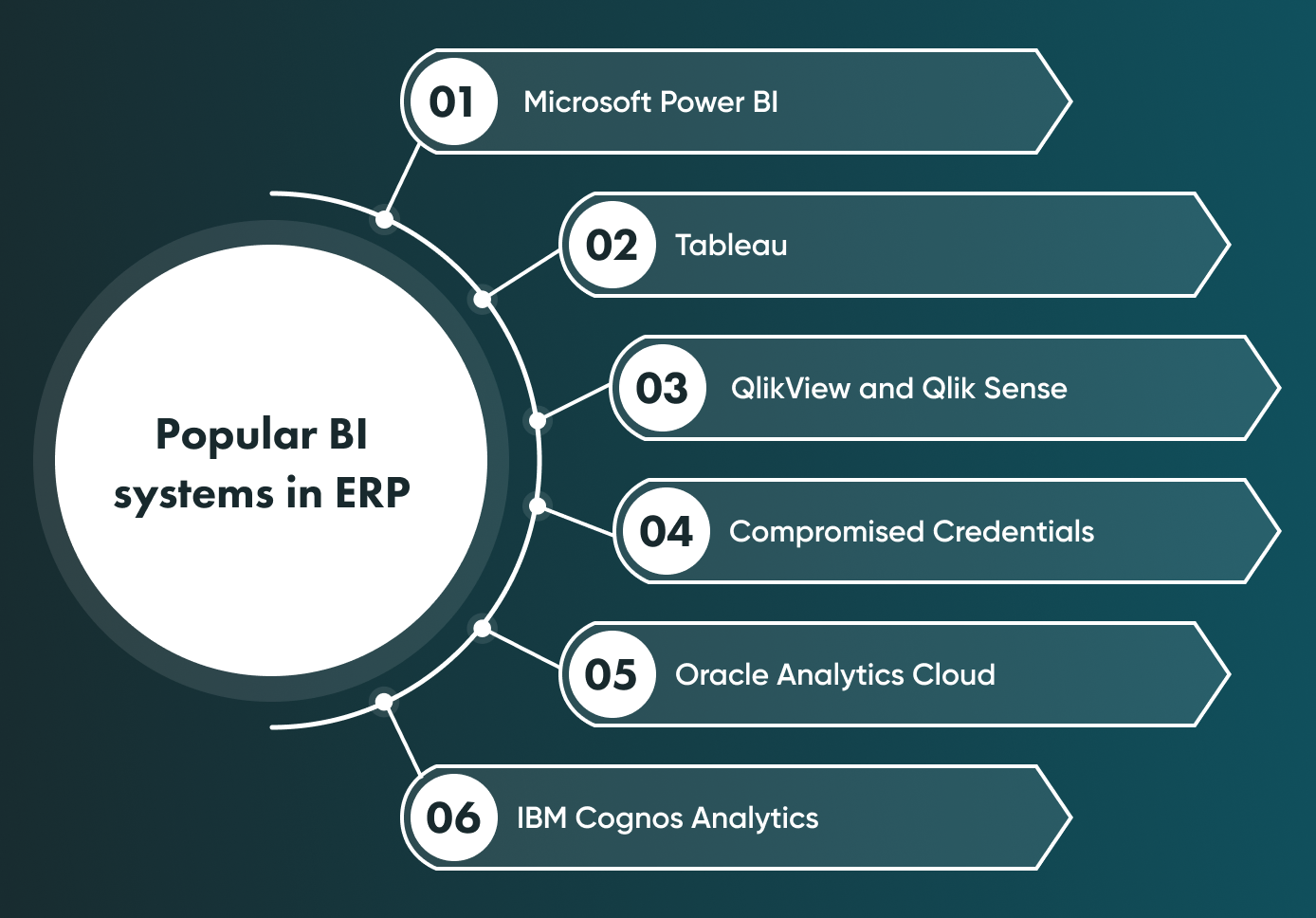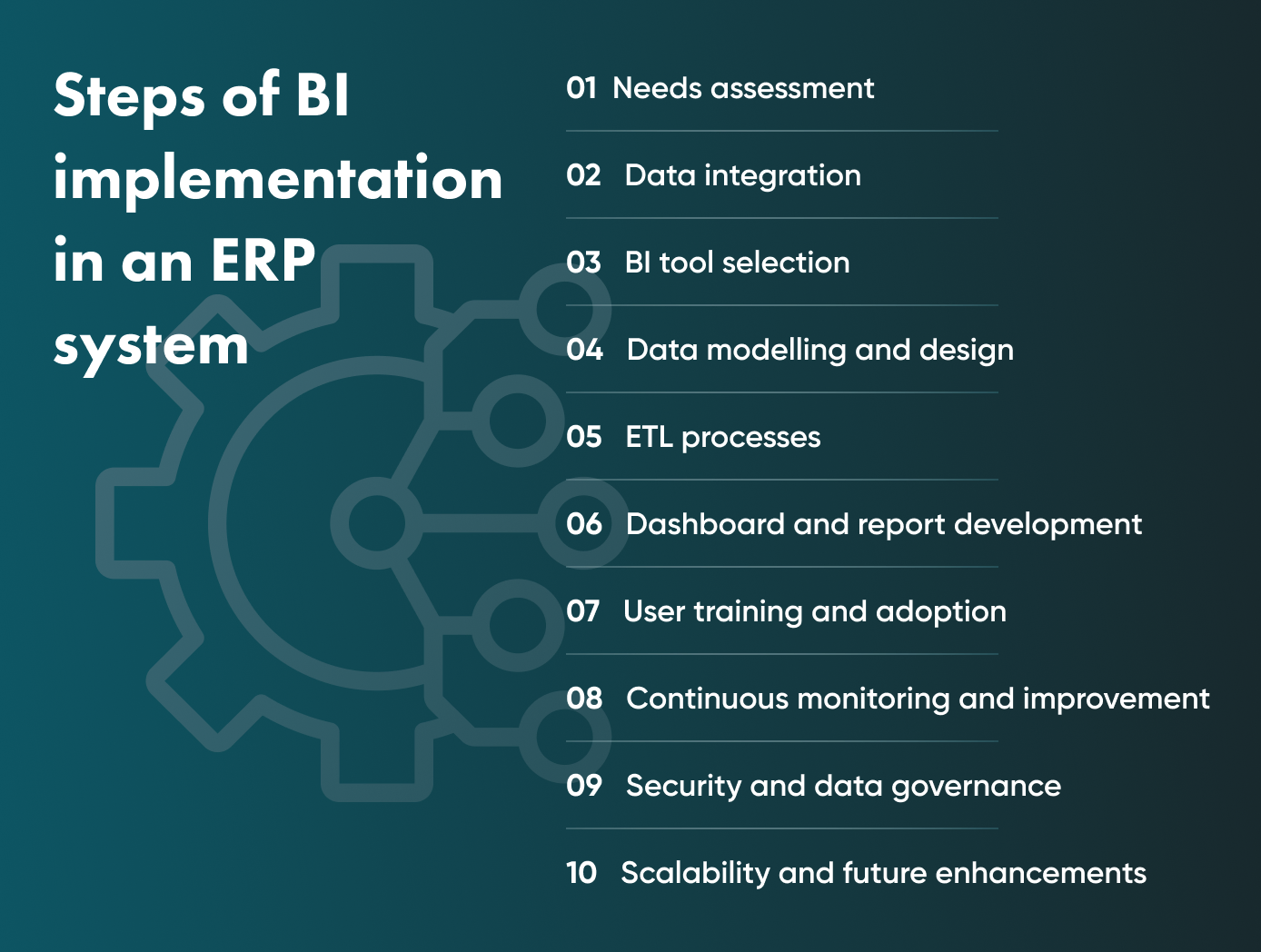How Business Intelligence in ERP Can Improve Your Company


Businesses today are constantly seeking innovative approaches to gain a competitive edge. In this landscape, integrating business intelligence (BI) with enterprise resource planning (ERP) systems makes for a transformative alliance.
This article delves into the practicality, benefits, and challenges of implementing BI within ERP, showcasing the potential to revolutionise data processing, analysis, and utilisation.
However, integrating business intelligence into ERP systems is not without its challenges. Addressing these challenges enables organisations to maximise the potential of business intelligence within their ERP systems and overcome obstacles on their path to data-driven success.
So, let's take a look at this powerful combination and reveal the role of business intelligence in ERP.
Distinguishing between ERP and BI
ERP systems and BI complement each other, but they possess distinct strengths. ERP systems primarily function as process management software, handling crucial business processes like manufacturing, inventory management, finance, and supply chain. By centralising data and breaking down silos, ERP systems enhance organisational efficiency.
On the other hand, BI takes this data a step further by enabling businesses to organise, analyse, and contextualise information from across the company, generating actionable insights.
BI facilitates the creation of intuitive dashboards and visualisations, simplifying the comprehension of complex data. Furthermore, ERP and BI serve different decision-making levels. ERP systems excel at the operational level, providing real-time insights into the performance of various functions. However, BI utilises this data and additional information to delve deeper into performance metrics, identify trends, and refine strategies at both high-level and granular levels.
If you want to understand the basics of BI, read our article about data visualisation in business intelligence.
Whether it's evaluating the return on investment of a new digital marketing strategy or calculating the cost savings achieved through real-time inventory management, BI systems drive performance improvements while effectively managing costs, including saving time and resources.
Therefore, if we’re talking about ERP, business intelligence can be used as an additional tool to streamline various operations.
ERP with BI: A holistic approach
The significance of business intelligence in ERP systems is growing as companies recognise the need to effectively manage and derive insights from the vast volumes of data processed within these systems.
ERP systems handle a variety of data, such as sales figures, inventory records, production data, and customer orders. Incorporating business intelligence tools allows organisations to extract valuable insights from this data, enabling a deeper understanding of their business operations. With the help of BI capabilities, businesses can make informed decisions regarding resource allocation, operational enhancements, and more.
Integrating business intelligence and ERP systems provides a holistic view of the business by aligning with core processes. In addition, this integration enables swift access and analysis of data, facilitating timely decision-making.
How BI tools enhance ERP systems
ERP systems have become essential for improving the efficiency of data-related activities. However, businesses quickly realise that simply having an ERP solution is insufficient.
Using BI tools is crucial to make the data truly valuable. Something to consider if you’re thinking about ERP app development.
Here are some ways that business intelligence plays a vital role in ERP:
Data management
Even a small-scale ERP solution generates vast amounts of data daily. Without proper categorisation and processing, this data becomes a massive repository with limited practical application. BI addresses this issue by implementing proactive data management and warehousing strategies.
Utilising legacy data
Legacy data from previous software or processes holds significant value for businesses. However, extracting meaningful insights from this data can be challenging. BI tools are instrumental in analysing and leveraging legacy data effectively.
Eliminating Guesswork
Organisations can avoid relying on intuition or "gut instinct" when making critical strategic decisions by employing appropriate BI technologies. With the assistance of business intelligence, ERP systems may provide more accurate data, enabling the identification of relevant trends and patterns.
Benefits of utilising business intelligence in ERP systems
We’ve already discussed the overall value BI adds to ERP systems, but let’s get into some of the more specific advantages of the integration of business intelligence into ERP software now.

Measurement of key performance indicators (KPIs)
BI in ERP systems enables the measurement of various KPIs, including sales growth, productivity, profitability, customer satisfaction, employee satisfaction, and performance metrics of business processes.
By identifying the most critical KPIs for their business, companies can leverage BI software to gain insights into their company's performance and areas for improvement.
Access to actionable insights
BI empowers organisations to identify trends, patterns, and anomalies that may not be apparent through manual analysis. By transforming raw data into meaningful visualisations and reports, businesses can quickly grasp their performance dynamics, spot emerging opportunities, and address operational challenges.
With accurate and timely information, decision-makers can steer the company towards greater efficiency, profitability, and customer satisfaction.
Increased efficiency and productivity
BI provides employees with information that enhances their job performance and increases productivity. It also helps businesses identify operational inefficiencies and make necessary changes.
Enhanced customer service
BI helps companies better understand their customer’s preferences and needs, enabling improved customer service through effective customer relationship management systems.
Staff renewal support
Business intelligence and analytics in ERP assist owners in making better hiring and firing decisions by analysing employee performance data. As a result, it helps avoid biases and office politics, leading to more objective decisions.
Boost efficiency and maximise ROI by integrating BI with your ERP system. Contact Go Wombat and let us help you!
Top BI systems in ERP
Several popular BI systems are commonly integrated with enterprise resource planning systems. These systems provide robust analytics, reporting, and data visualisation capabilities.

Some of the popular BI systems used in conjunction with ERP include:
Microsoft Power BI
This widely adopted BI platform seamlessly integrates with various ERP systems. It offers interactive dashboards, rich visualisations, and advanced analytics capabilities. Power BI enables users to connect to multiple data sources, including ERP systems, and create insightful reports and visualisations.
Tableau
Tableau is a powerful BI tool that allows organisations to connect, analyse, and visualise data from ERP systems and other sources. It offers a user-friendly interface, drag-and-drop functionality, and various data visualisation options. In addition, Tableau supports real-time data analysis and provides interactive dashboards for data exploration.
QlikView and Qlik Sense
These are popular BI platforms known for their associative data modelling and self-service analytics capabilities. They enable users to explore data from ERP systems and other sources intuitively. Moreover, QlikView provides guided analytics, while Qlik Sense offers a self-service BI experience with drag-and-drop functionality.
SAP Analytics Cloud
This is an all-in-one, cloud-based BI solution offered by SAP. It integrates seamlessly with SAP ERP systems, allowing organisations to leverage their data for analytics and reporting.
SAP Analytics Cloud provides advanced features like predictive analytics, augmented analytics, and collaboration capabilities.
Oracle Analytics Cloud
This cloud solution is a comprehensive BI platform that integrates with Oracle ERP systems. It offers a range of analytics tools, including self-service analytics, interactive dashboards, and mobile capabilities. Oracle Analytics Cloud supports advanced analytics, data preparation, and data storytelling.
IBM Cognos Analytics
Finally, there is this robust BI platform connecting various data sources, including ERP systems. It provides self-service analytics, interactive dashboards, and AI-driven insights. IBM Cognos Analytics offers advanced data modelling, report generation, and visualisation capabilities.
These are just a few examples of popular BI systems used with ERP systems. The choice of BI system may vary depending on an organisation's specific needs and requirements and the ERP system being utilised.
Therefore, evaluating BI systems' features, compatibility, and integration capabilities is crucial before selecting the most suitable one for your ERP environment.
The process of BI implementation in an ERP system
Implementing business intelligence in ERP systems involves systematically integrating BI tools and strategies into the existing ERP infrastructure. The process can be outlined as follows.

1. Needs assessment
Conduct a thorough needs assessment to identify the specific requirements and goals for implementing BI in the ERP system. This involves understanding the business objectives, data analysis needs, and reporting requirements.
2. Data integration
Establish a robust data integration framework that allows seamless extraction, transformation, and loading of data from various sources, including the ERP system, into the BI environment. This ensures that relevant and accurate data is available for analysis and reporting.
3. BI tool selection
Evaluate and select appropriate BI tools that align with the company’s requirements. Consider factors such as data visualisation capabilities, analytical functionalities, scalability, user-friendliness, and compatibility with the ERP system.
4. Data modelling and design
Develop a comprehensive data model and design architecture to integrate ERP data with BI tools. Define data relationships, hierarchies, and dimensions for practical data analysis and reporting.
5. ETL processes
Implement Extract, Transform, and Load (ETL) processes to extract data from the ERP system, transform it into a suitable format for analysis, and load it into the BI environment.
This involves cleansing, aggregating, and structuring the data to ensure its quality and consistency. Feel free to read our detailed article about ETL for a better understanding.
6. Dashboard and report development
Create intuitive dashboards, reports, and visualisations catering to stakeholders' needs. Design interactive and customisable dashboards that provide real-time insights into KPIs and enable drill-down capabilities for detailed analysis.
7. User training and adoption
Provide comprehensive training to users on effectively utilising the BI tools integrated with the ERP system. Foster a culture of data-driven decision-making and encourage user adoption by demonstrating the value and benefits of using BI for informed decision-making.
8. Continuous monitoring and improvement
Regularly monitor the performance of the BI implementation, assess user feedback, and identify areas for improvement. Optimise the data integration processes, refine dashboards and reports based on evolving business needs, and incorporate user suggestions to enhance the overall BI experience.
9. Security and data governance
Implement robust security measures to protect sensitive data and ensure compliance with data governance regulations. For example, define access controls, data encryption protocols, and data retention policies to maintain data integrity and confidentiality.
10. Scalability and future enhancements
Plan for scalability and future enhancements by considering the organisation's growth trajectory and evolving BI requirements. Ensure the implemented BI solution accommodates increased data volumes, additional data sources, and evolving analytical needs.
Challenges in integrating BI with ERP Systems
Integrating business intelligence into ERP software poses various challenges that must be addressed to ensure successful implementation. Let’s take a look at them.
Alignment of processes
A crucial requirement is harmonising all departments and their operations within the company. This involves KPIs, reports, operational workflows, and other elements. Without this unity, implementing business intelligence may be impractical or ineffective, hampering the company's productivity.
Comprehensive data integration
Integrating BI into custom ERP software requires considering all internal and external data sources to provide a holistic business view. Achieving consistency in data integration processes is essential for accurate and meaningful insights.
Strategic planning
A well-defined BI strategy should cover all aspects of process and operational changes, including harmonising KPIs, reporting mechanisms, and user feedback. Furthermore, adequate staff training is vital to ensure they know upcoming updates and their new roles and responsibilities.
Customisation of BI-enabled ERP
Lack of customisation according to business needs is a common challenge when implementing BI tools. Off-the-shelf solutions often fail to meet specific requirements, resulting in poor usability and decreased profitability.
In contrast, developing a custom ERP system with integrated BI functionality ensures that the software aligns with the business’ unique workflows and requirements and can be easily upgraded.
This is why it is recommended that you order custom ERP application development with BI solutions inside from a skilled company like Go Wombat.
In conclusion
Integrating business intelligence in enterprise resource planning systems is a game-changer for organisations seeking to understand their business performance comprehensively.
By harnessing the power of data analytics, BI-ERP integration empowers decision-makers with real-time insights, actionable information, and the ability to make data-driven decisions that drive growth and success.
That said, companies must strategise and align their goals with clear objectives to implement BI in ERP effectively. The customisation of a BI-powered ERP solution ensures that it caters to specific business needs and workflows, enabling optimal usability and profitability.
By investing in software development services, organisations can create a tailored solution that fully leverages the potential of BI within their ERP system.
Doing everything independently without the relevant experience and skills can be challenging. However, you can count on Go Wombat’s expertise in ERP software development services to build what’s right for your company.
Let our experienced software development team guide you through integrating BI into your ERP system. Contact Go Wombat!
Unlock Success with Premium Software Development
Contact us


FAQs
Why is business intelligence used in ERP?
Business intelligence tools provide relevant and timely information to companies, helping them make better decisions. By analysing the vast amounts of data within an ERP system, business intelligence enables users to identify trends, patterns, and insights that may not be apparent through manual data analysis.
This improved understanding of data empowers decision-makers to make informed choices that drive business growth and efficiency.
What are the benefits of BI in ERP?
Business intelligence in ERP systems offers benefits such as the measurement of key performance indicators, access to actionable insights, increased efficiency and productivity, enhanced customer service, and support in staff renewal.
The overarching advantage is a deeper understanding of the business at hand, leading to more informed and improved decision-making capabilities. Organisations can optimise their operations and drive business success using BI capabilities within ERP systems.
Why business intelligence is practical in ERP systems
As the volume of data processed within ERP systems expands, businesses recognise the importance of incorporating business intelligence tools. Businesses can extract valuable insights from their data, gaining a deeper understanding of their operations.
With the help of BI capabilities, businesses can make informed decisions regarding resource allocation, operational enhancements, and more. Integrating business intelligence and ERP systems provides a holistic view of the business, allowing for better alignment with core processes.
How can we help you ?






